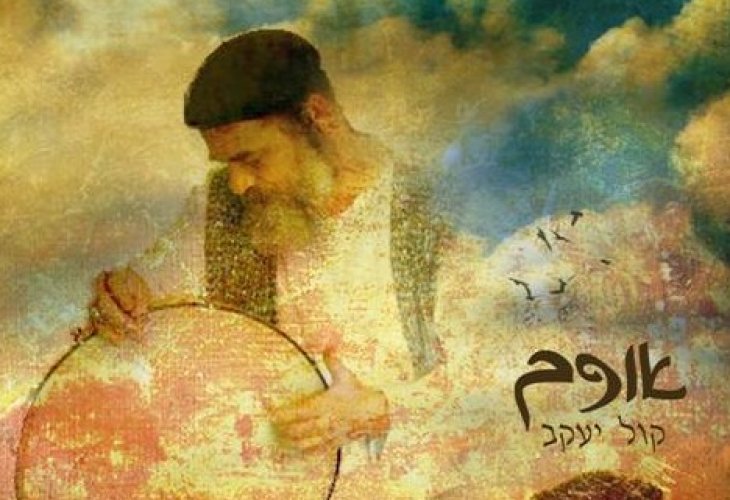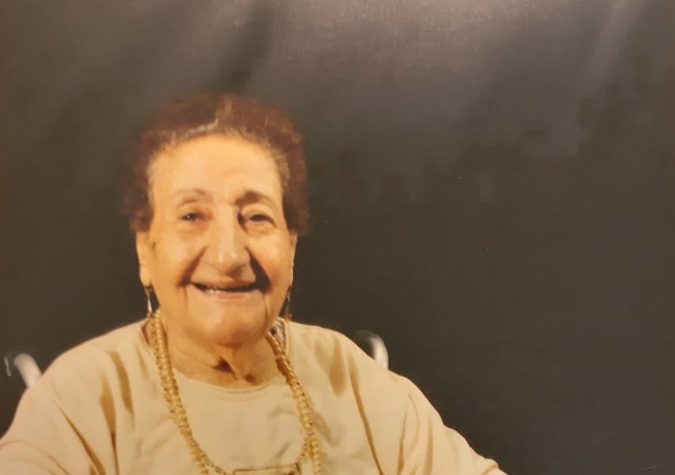"One Saturday Night I Fell and Became Disabled": Compelling Interview with Nechama Ambar
Nechama Ambar, age 89, born in Iraq, gives us a rich account of her childhood, adulthood, and senior years.
 Nechama Ambar (Photo: Private Collection)
Nechama Ambar (Photo: Private Collection)Nechama Ambar, age 89, was born in Iraq and was orphaned from her father at a young age. At 18, she immigrated to Israel with her brother and sister-in-law, arriving at a transit camp in Atlit. From there, the family moved to Magdiel, and Nechama married her cousin Yosef. They lived in Jerusalem and had five children, and later many grandchildren and great-grandchildren. Over the years, Nechama worked as a seamstress and a childcare worker. Today, she lives in a retirement home and enjoys listening to Torah classes.
A significant event that left a mark on me:
"Immigrating to Israel. When we lived in Iraq, our Arab neighbors treated us with great respect, and we had good friendships. I remember a time in Baghdad when Arabs harmed many Jews, but where we lived, every Arab protected their Jewish neighbor. They even brought us pomegranates and branches for our holidays, and during Passover, they would buy our chametz. However, one Friday night, Arabs seriously damaged Jewish property—stores and homes—and prohibited purchasing goods from Jews. Many community members, who were very wealthy, suddenly found themselves in a difficult economic situation. We felt that the blessing had left the Jews of Iraq, and around the same time, the opportunity to immigrate to Israel began. At 18, together with my brother and his wife, I was fortunate to immigrate to Israel on a plane with 30 other families from Baghdad. The rest of the family joined later. As soon as we got off the plane, we bowed and kissed the ground of the land."
"From the plane, we arrived at a transit camp in Atlit, where we lived in a tent for two months. We were welcomed very warmly, and we felt great happiness in our fortune to come to Israel. We had nothing, as we were not allowed to leave Iraq with any possessions at all, so food was distributed to us in the transit camp. On the first day, we received a plate, cup, fork, knife, two slices of bread, a spoonful of cheese, and a cup of tea. Additionally, each person received an iron bed, a straw mattress, a straw pillow, and a cloth to cover the bed. In the camp, there were translators who translated everything said to each newcomer in their language, and we were very happy, without any complaints."
The thing I am most glad I did in my life:
"Helping others. I always tried to help everyone in need, never saying I couldn't or to come back later. From what I had, and even when I had little, I found joy in giving to others. I remember, for example, during the Six-Day War, living in the Beit Yisrael neighborhood, and when the war started, many people entered our home. The house was so full it was at capacity with people en route to various places. The next morning, after a sleepless night, we discovered our house was still standing, still with electricity and water, while other places had been damaged."
"Additionally, I am glad I had the opportunity to build a home, raise children, and see many descendants. They all respect me greatly and come to visit the retirement home."
 (Photo: Private Collection)
(Photo: Private Collection)Something I regret:
"It was very painful when my husband passed away about 17 years ago. He suffered from Alzheimer's for 8 years, and I cared for him at home. After his passing, I stayed in the home for another 10 years."
A significant insight I've gained in life:
"That one should help everyone and also be joyful and not complain. I've never cried over anything, even when times were tough. My husband and I worked hard for our livelihood but found happiness in what we had. We initially lived in a small house with damp walls and couldn't afford to buy a house. Later, when they began building new homes in the Ramat Eshkol neighborhood, I asked my husband to buy there. In a wonderfully miraculous way, we managed to obtain a loan and bought a house in a new building when the streets were still dirt. Step by step, we progressed, and we lived in that house for years."
A person who left a strong impression on me:
"My father-in-law, may he rest in peace, Rabbi Moshe Ambar, who was a righteous and humble person. My father passed away when I was a little girl, and I don't even remember him. After our marriage, we lived with my husband's parents for three years, and my father-in-law treated me like a daughter, always speaking to me with respect and admiration. He studied at Rabbi Tzadok Hacohen's Kabbalist Yeshiva in Nachlaot and was very modest. After he died, a book, 'Yirat Hashem,' containing his sermons, innovations, and interpretations, was published. I remember how all the neighbors, who called him 'Chacham Moshe,' came to our house to hear his Havdalah. He lived in the Batei Warsaw close to the Neturei Karta Chassidim and would speak Yiddish with them. We named our three sons with the names he told us—Shaul, David, and Shlomo. Not long ago, I heard a Torah lesson about all three of them and was reminded of him."
What changed in me since I turned 70:
"Even after my husband passed away, I continued with my usual zest for life, hosting and visiting. One Saturday night, I fell and broke my hip, and since then, my life changed. I was hospitalized for a period, became disabled, and made the decision to move to a retirement home despite the high cost involved in living there. I asked my children to find the closest home to them, and I moved there. This way, I ensured I would be well cared for."
What changed in my surroundings since I turned 70:
"My children needed to be more with me, especially since the fall, and therefore I am glad I reached the retirement home, alleviating this burden from my children. They, of course, continue to visit, but they need to worry less about various technical matters."
From the height of my years, the most important thing in life is…
"Family, and of course, health and livelihood."
What I want to leave in the world:
"I am leaving the home I built—the family I was fortunate to raise. Twice a year, on Chanukah and on my husband's memorial anniversary, they all come to have a big family gathering at the retirement home. They come from all over the country; no one is missing. It's a great joy for me to see this large family that I was blessed to produce."
Do you have a grandparent who would like to share their experiences and insights? We'd love for you to write to us and we'll get back to you: support@htv.co.il

